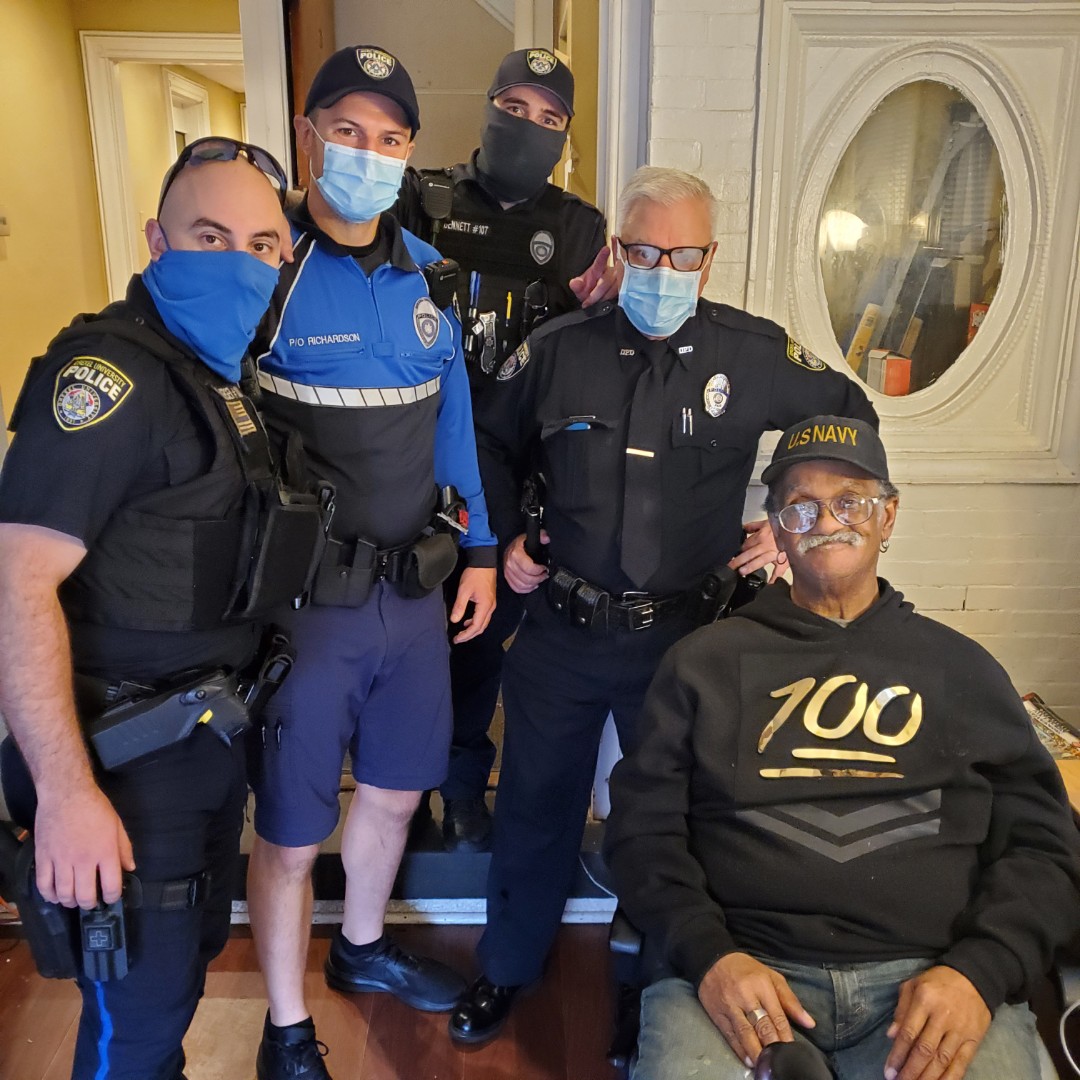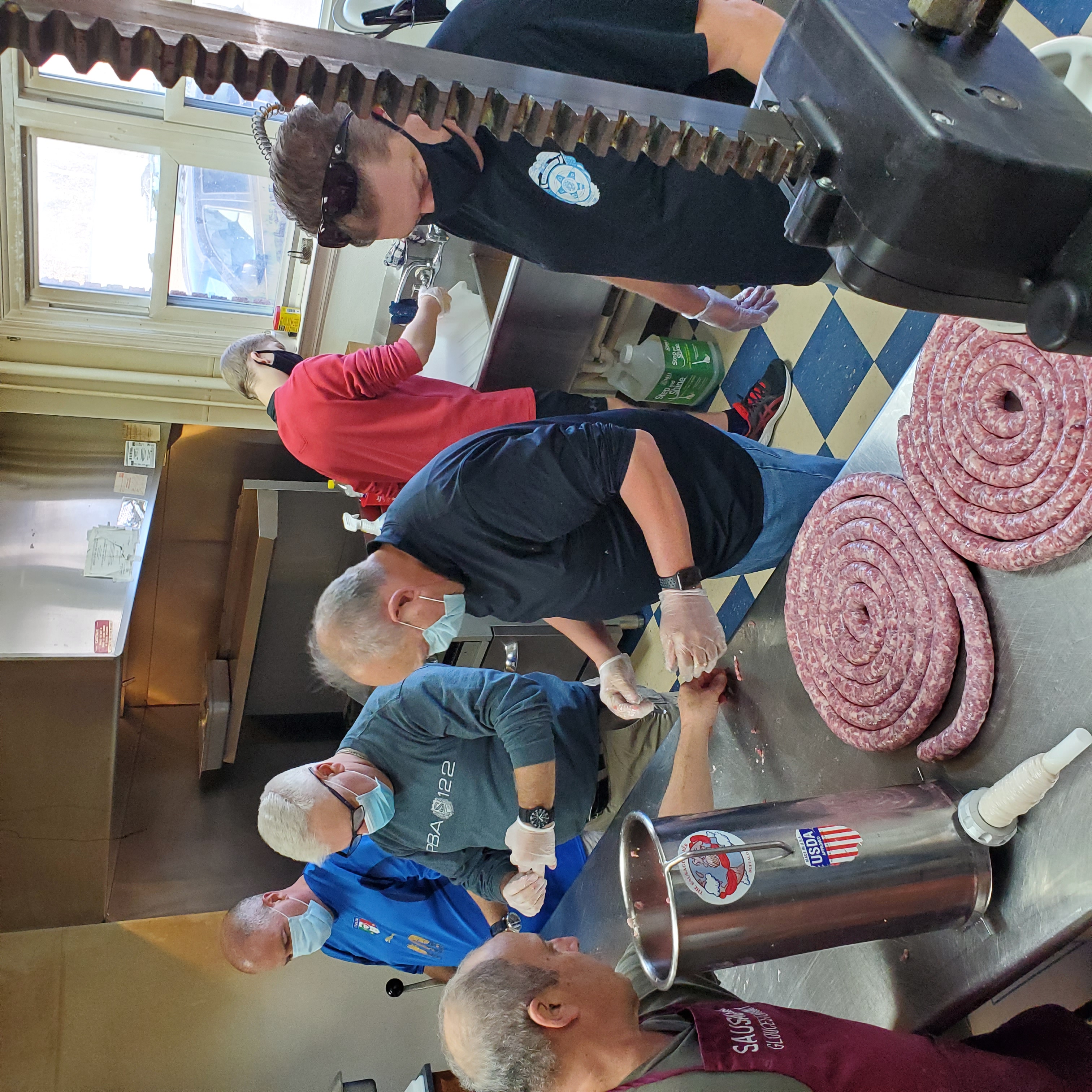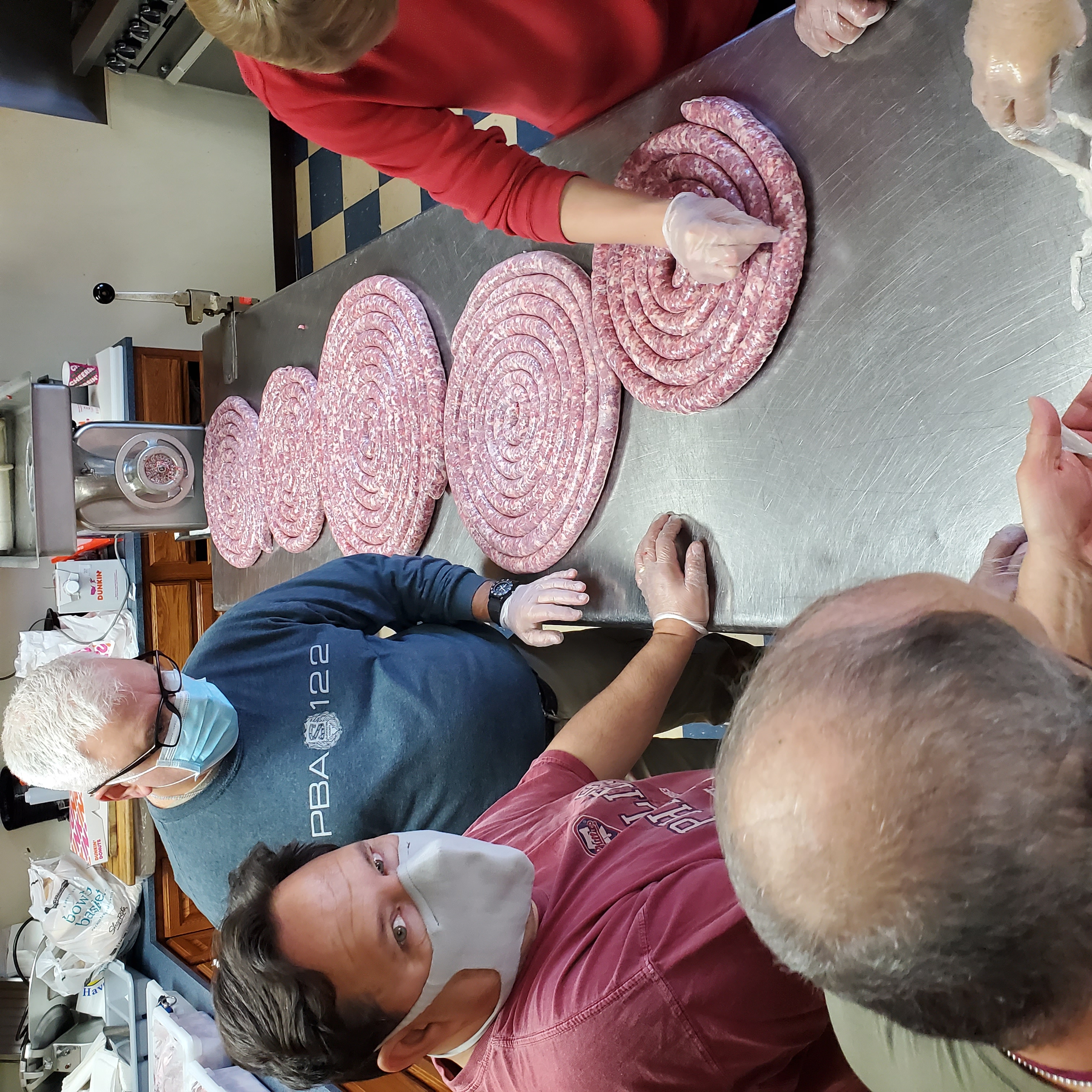Contact Us
To provide feedback on the Community Policing Dispatch, e-mail the editorial board at CPDispatch@usdoj.gov.
To obtain details on COPS Office programs, publications, and resources, contact the COPS Office Response Center at 800-421-6770 or AskCopsRC@usdoj.gov

U.S. Department of Justice
Office of Community Oriented Policing Services
Washington, DC 20530

Police meet a wide variety of challenges while on duty. But last November, eighteen officers of Drexel University’s Department of Public Safety (DPS) in Philadelphia faced a unique one on their day off: sausage making.
The idea for the project came to Sgt. Charlie Barone in October of 2020 as he thought about Thanksgiving and how the department could help the veterans living in two group homes located on the campus.
DPS, which maintains a friendly relationship with the vets, regularly donates clothing, food, and other things. “They served our country and for whatever reason, fell on hard times,” says Barone. “So we try to make life a little easier for them.”
“And to show our appreciation, I thought that providing food for upcoming holiday meals would be a good idea,” he said.
A couple of turkeys might seem an obvious choice, but Barone thought that the veterans would most appreciate something that would provide meals throughout the coming months. “They could grill the sausage, put it in pasta or serve it other ways, and it would last throughout the holidays,” says Barone.
Guidance from a Former Sheriff Who is Now the Sausage King
He also had a special connection for providing these meals: Vito, the Sausage King of New Jersey.
 A retired sheriff’s lieutenant from Gloucester County, New Jersey, Vito DiGiovacchino is also a military veteran known for donating sausage to raise funds for charitable causes. Both Barone and DPS Officer Morgan Meehan worked with him in their previous jobs, serving in the county’s Woodbury (New Jersey) City Police Department and Woodbury Heights (New Jersey) Police Department respectively.
A retired sheriff’s lieutenant from Gloucester County, New Jersey, Vito DiGiovacchino is also a military veteran known for donating sausage to raise funds for charitable causes. Both Barone and DPS Officer Morgan Meehan worked with him in their previous jobs, serving in the county’s Woodbury (New Jersey) City Police Department and Woodbury Heights (New Jersey) Police Department respectively.
Says Meehan, “The jail was behind our police department and if Vito had made sausage recently, he would bring it in for those who worked there. When you took a prisoner to booking you might get a sausage sandwich too.”
Vito, who learned his craft in his father’s grocery/butcher store, was enthusiastic about supporting the veterans. And to help the officers’ funds go further, he suggested that they buy the pork in bulk and make the sausage themselves.
With donations from others in the department, Meehan and Barone bought 400 pounds of pork butt from a food distributor who gave them a price break on the meat and additional food items.
The next challenge was finding a kitchen. The Veterans of Foreign Wars (VFW) Post 5579 in Gibbstown, New Jersey, offered theirs, and the group, which included the teenaged son of a recently deceased officer, got to work.
 With the assistance of Vito and his twin brother Gene, the team cut the meat up, ground it with various spices, put the sausage in cases, and cut those up into links—making about 2,000 hot, sweet, basil and onion, and breakfast sausages.
With the assistance of Vito and his twin brother Gene, the team cut the meat up, ground it with various spices, put the sausage in cases, and cut those up into links—making about 2,000 hot, sweet, basil and onion, and breakfast sausages.
“It was very greasy, but fun,” says Meehan, “and an opportunity to spend time together for a really terrific cause.”
The sausage-making project was one of many outreach activities that DPS officers engage in through their Community Resources Department as well as on their own.
Among them is a joint program with the Philadelphia Police Department (PPD) to give school supplies to local children. They also collect and deliver food to Ronald McDonald House, which provides housing for parents of children being treated in local hospitals.
DPS Keeps Students, Faculty, Staff, and Area Residents Safe
But their focus is on ensuring a safe environment on Drexel's main campus and its College of Medicine’s campus, as well as in the surrounding neighborhoods.
“We are always out there,” says Barone, “not just responding to calls, but proactively patrolling by foot, bike, and car on the streets and campus paths. We talk with students and other people about what is going on, so they know we are there to keep them safe.”
To this end, DPS also offers self-defense training and classes in crime and rape prevention. On request, they make presentations on these topics to fraternities, sororities, athletic teams, faculty, and local community groups as well. They also deliver virtual presentations on situational preparedness.
Asked how DPS handles student protests and other large gatherings, Barone says, “We work with a lot of different groups and respect all rights to free speech and assembly. The department also makes sure our officers understand LGBTQ individuals and respects how everybody views themselves, so we can help them stay safe and enjoy their time at school.”
“But we remind students that city residents should be treated with respect too,” he adds, “and tell them to keep noise down, for instance. We’re also trained in how to deal with mental health or drug issues, as well as de-escalation tactics to keep situations from turning into physical altercations.”
A Full-Service Police Department with a Varied Community
 Noting that though campus policing is different in some ways, Meehan says that DPS is a full-service police department like any other. Their 40 person staff, which comprises detectives as well as patrol officers, also includes a victim witness coordinator who supports victims’ emotional needs and helps them navigate the criminal justice system.
Noting that though campus policing is different in some ways, Meehan says that DPS is a full-service police department like any other. Their 40 person staff, which comprises detectives as well as patrol officers, also includes a victim witness coordinator who supports victims’ emotional needs and helps them navigate the criminal justice system.
“And like in any big city, we have crime,” he adds "shootings, car-jackings, things like that. If it happens on our footprint, it is our job, and we work on it from beginning to end. We don’t pawn jobs off on the PPD.”
“In some cases, we work hand in glove with the [PPD], though maybe not as the lead. Our detectives do an initial investigation report and gather evidence, but for more technical services such as a shooting response team and more specialized evidence gathering, Philadelphia Police would be called for assistance.”
Asked why he joined a campus police department, Meehan said, “There were two former Woodbury police officers already at Drexel and their constant cajoling finally convinced me that I still had some gas left in the tank and should join DPS.”
What Makes Campus Policing Different
“For several of us, this is our second law enforcement job,” he adds. “It’s how we can stay active. And as a result, the department is very diverse in terms of age, as well as race and gender.”
 Explaining what makes campus policing different, Meehan says, “This type of policing is more intimate, more personal than municipal police work. We have the luxury of being able to spend more time on solving people’s problems and completing the task to the end.”
Explaining what makes campus policing different, Meehan says, “This type of policing is more intimate, more personal than municipal police work. We have the luxury of being able to spend more time on solving people’s problems and completing the task to the end.”
“Municipal officers typically go from call to call. They write their reports, and that might be the last they hear about a job. But in this case, I can follow a job to its completion, working not just with students but area residents too.”
“Police departments have personalities,” he says. “I would like to think ours is both professional and approachable, and that is what I like most about campus policing. People are more likely to approach us than city police, because we have more time to talk, and we are really more service-oriented.”
“Most people want to like police and want to engage in conversation, and we have the time to spend with them,” Meehan adds.
And for DPS officers, a lot of that time is given both on patrol and off duty, to make sausage for veterans, allay the fears of mothers who’ve just dropped off their “babies” at college, walk a young man suffering from stress to the counseling department, and many other ways.
As for the sausage, it was delivered on Veterans Day, and enjoyed throughout the holidays that followed.
Faye C. Elkins
Sr. Technical Writer
COPS Office
Photos courtesy of the Drexel University Police Department.
Subscribe to Email Updates
To sign up for monthly updates or to access your subscriber preferences, please enter your email address in the Subscribe box.






